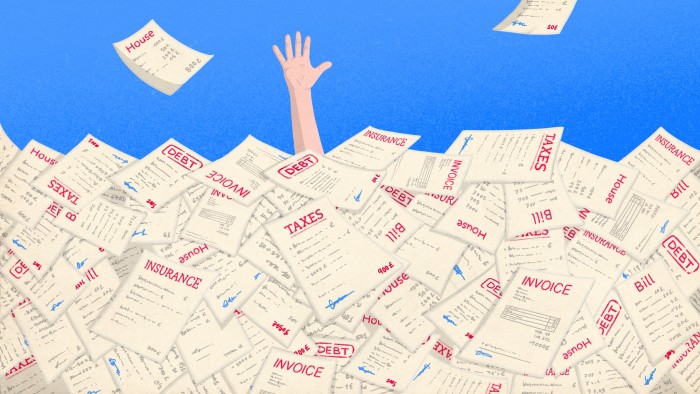How can we defuse the household debt time bomb?


Roula Khalaf, Editor of the FT, selects her favourite stories in this weekly newsletter.
This article is the latest part of the FT’s Financial Literacy and Inclusion Campaign
Mortgage borrowers may have breathed a sign of relief this week as interest rates appeared to reach their peak. But look beyond the headlines and a much nastier, harder-to-solve debt problem is lurking.
I am talking about the record £22bn UK households are now estimated to owe in unpaid essential bills including utilities, council tax, plus benefit and tax credit overpayments — a ticking time bomb that Citizens Advice claims policymakers are failing to listen to.
A 34 per cent jump on pre-pandemic debt levels, a new paper entitled “Countdown to a household debt disaster” attempts to show the true scale of this hidden problem.
Incredibly, government and utility regulators don’t collect or publish comprehensive data on these sorts of debts, unlike mortgage and credit card arrears. But that £22bn figure overshadows the £16.9bn value of outstanding mortgage balances with arrears.
Citizens Advice says a grim tipping point has been reached. The inability to pay household bills has become the biggest driver of people approaching the charity for help, and these debts are much more problematic to resolve.
For starters, 50 per cent of people seeking advice have no way of repaying these debts. Known as a “negative budget”, your income won’t cover your basic outgoings. Each month, you sink further into debt.
The fact that rents are now rising at the fastest rate since records began is a major factor (Citizens Advice separately estimates that rent arrears could now top £900mn). This, in turn, has caused an alarming rise in homelessness, as my FT colleague Jennifer Williams reported this week; an even more expensive problem for society to solve.
As the nature of problem debt changes, debt charities are helping more people in full-time work, and increasingly, more people with mortgages.
Credit rationing is another fast-growing issue as more people fall behind with essential payments.
Banks only want to lend money to those who pose the least credit risk. Charities tell me one in five people struggle to borrow from a mainstream lender as their debt history harms their credit score.
This is going to be a lasting legacy of the cost of living crisis — it takes six years for any black marks to vanish. And even if borrowers with less-than-perfect scores can obtain credit, they will pay through the nose.
So what are the solutions? Let’s start with what the financial sector could do to better serve the customers it excludes by supporting the growth of Community Development Finance Institutions (CDFIs).
If you haven’t heard of CDFIs, these lenders with a social purpose are doing a brilliant and important job, providing affordable loans to credit-impaired people and small businesses at far lower rates than they could otherwise access. There’s just one problem. They’re tiny!
In order to scale up and support more of the customers the big banks are rejecting, CDFIs need financial backing. In the US, the big banks are forced to support community lenders, but that’s not the case in the UK.
Salad Money is a CDFI which makes affordable loans to key workers (one-third of its borrowers work for the NHS). The term affordable is relative — it charges an APR of 79 per cent to lend £1,000 over 18 months. But in the world of subprime credit, this is very cheap.
Salad shuns credit scores, instead using Open Banking to view the ins and outs of applicants’ bank accounts. It says this provides a more accurate picture of how they manage their finances, and what they can realistically afford, reducing the risk of default.
However, chief executive Tim Rooney told me this week that while he has secured finance from Shawbrook Bank and the government’s Dormant Assets Scheme, he cannot persuade UK institutional investors to get on board at scale (he fears “the taint of Wonga” is to blame).
Instead, Salad has secured a £40mn lending facility from a US fund to support expansion. However, Rooney thinks he could cut the APR on customer loans by as much as 10 percentage points if Salad could secure funding from UK-based investors at commercial rates.
Thinking back to the chancellor’s Mansion House speech about unlocking investment potential, one could cast CDFIs as UK companies ready to scale up using technology better to serve a booming consumer market.
Obviously, there is a social purpose here too. But if the banks get on board (as they have done in the US) this could also be a fruitful long-term investment for them.
Most Salad customers are already customers of mainstream banks, but cannot get loans, overdrafts or credit cards from them. Being accepted for and successfully repaying a loan from a CDFI will improve their credit score.
Salad is eager to work with high street banks and (with customers’ consent) share data to convince mainstream lenders that people in “credit rehab” deserve a second chance.
And big banks could do a much better job of raising awareness and signposting CDFIs when they reject customers with poor scores.
Even if CDFIs reject loan applicants, they will try and help in other ways, using benefit checkers to identify tens of millions of pounds’ worth of help people didn’t know they were entitled to.
And kudos to NatWest which has funded non-repayable hardship grants of £100 for tens of thousands of people who didn’t meet the affordability requirements for a CDFI loan.
As for the government, ending the council tax “debt trap” where people become liable to pay their entire annual bill after missing a single month’s payment is something charities have long campaigned for.
Capping the amount of benefits that can be docked to repay government debts or arrears on utility bills would help many in “negative budgets”.
We should reform the insolvency rules to remove the upfront costs of going bankrupt (which costs £680) or agreeing a debt relief order (£90).
Charities tell me the impossibility of paying these fees drives people to seek more toxic debt solutions online, where tougher regulation is urgently needed to protect consumers.
And let us not forget the energy companies. Under the current funding model for free debt advice, they don’t have to contribute a single penny — even though energy debts are a huge and growing source of referrals.
These lesser-known debt problems don’t generate as many column inches as rising interest rates on mortgages — but over to you, FT readers. If you can do something — anything! — to raise awareness of these hidden issues with your MP or power players within your industry, millions of people struggling will be forever in your debt.
Claer Barrett is the FT’s consumer editor and the author of ‘What They Don’t Teach You About Money’. claer.barrett@ft.com Instagram @Claerb


Comments